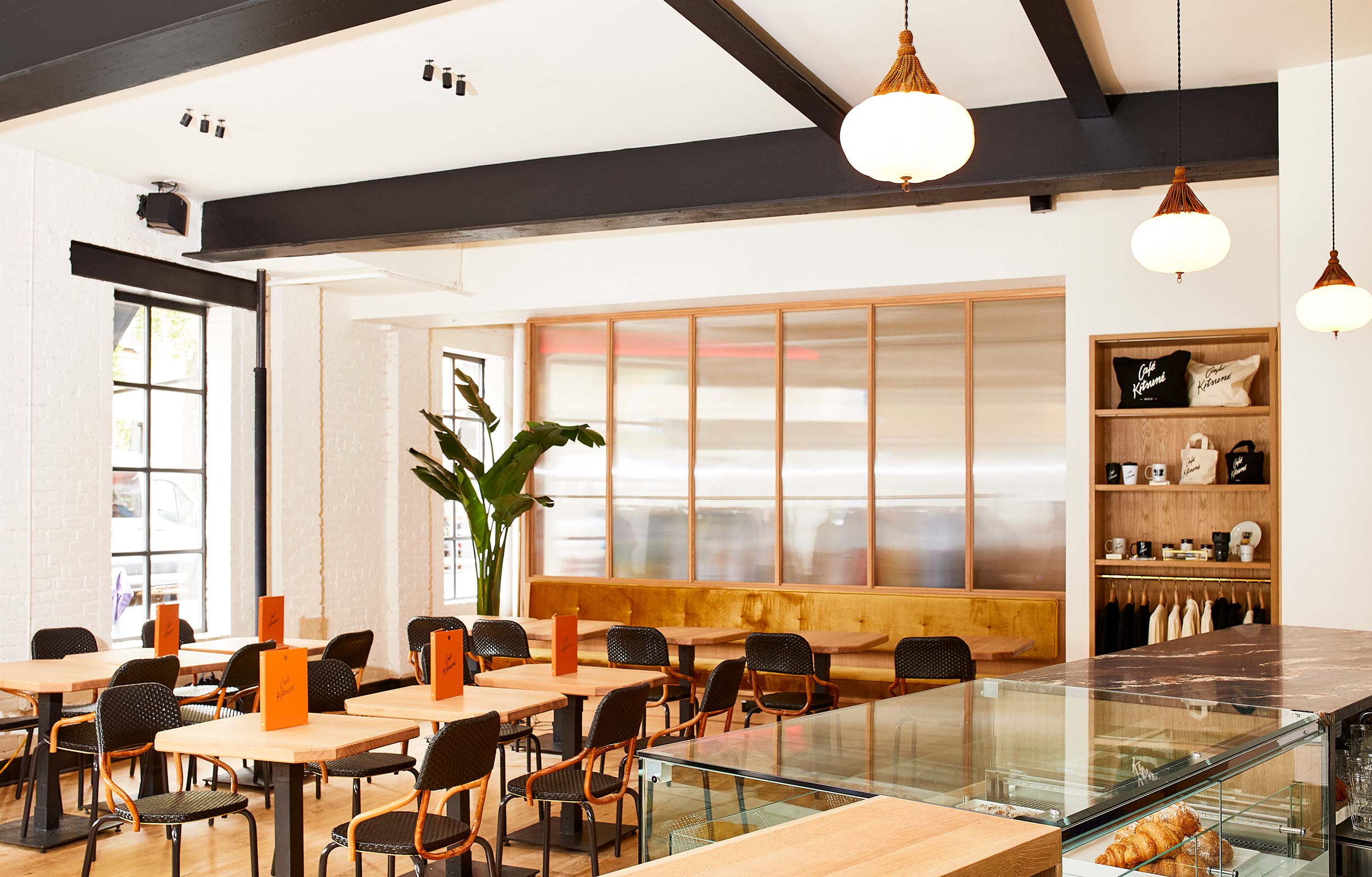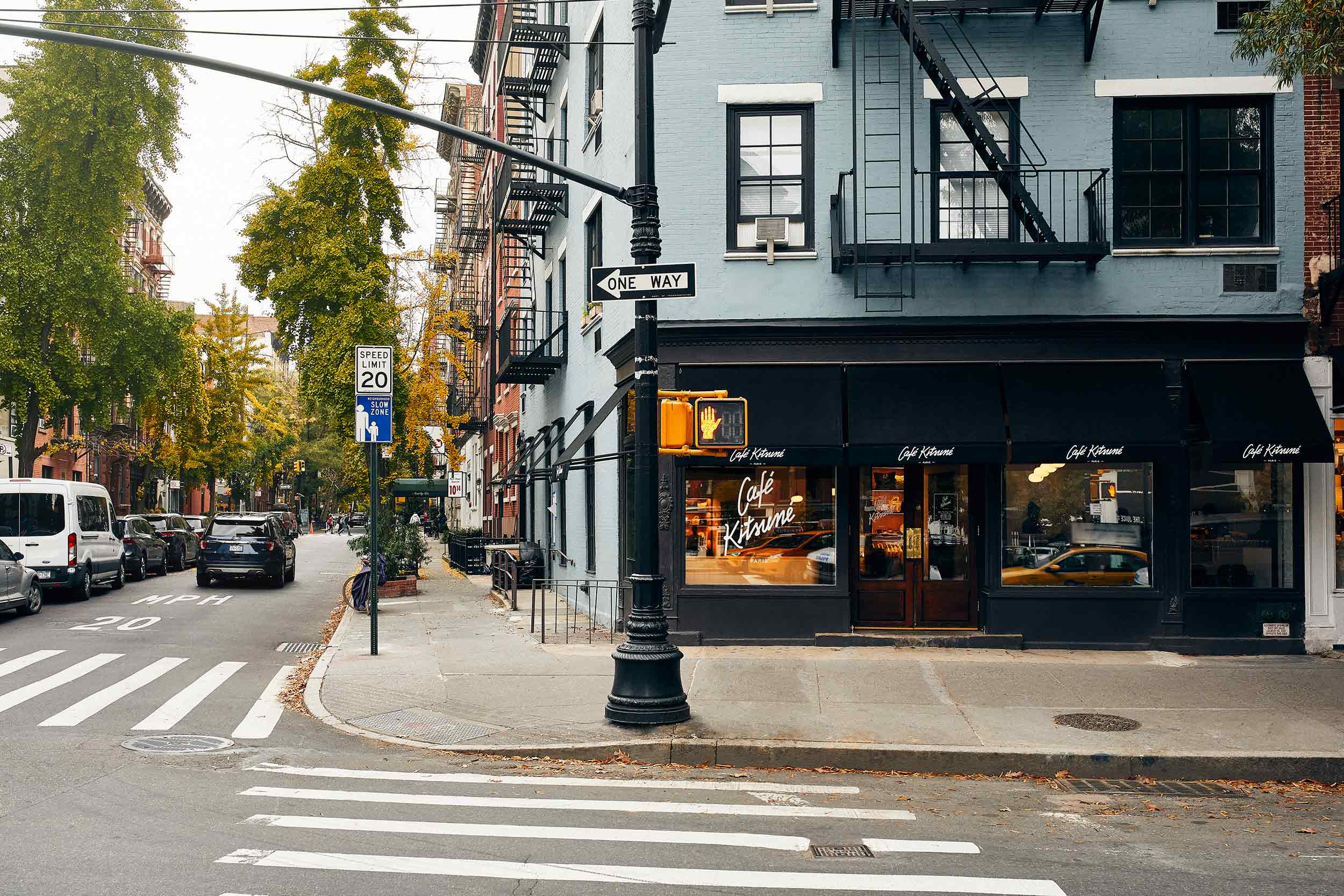After establishing their fashion line and record label, founders Gildas Loaëc and Masaya Kuroki set their sights on hospitality.
At the charming southeast corner of Perry and Hudson Street sits a new addition to New York’s range of coffee shops, this time owned and operated under the exuberant Maison Kitsuné name. With ambient lighting, wicker chairs, specially-made porcelain, and fox-shaped shortbread cookies, Café Kitsuné has landed in downtown Manhattan, following successful operations in Paris, Tokyo, Seoul, and Okayama.
Intercontinental and interdisciplinary, Maison Kitsuné is doing it all. Between their house brand’s fashion line, record label, and coffee shops, founders Gildas Loaëc and Masaya Kuroki are the ultimate power duo, merging Parisian luxury with Japanese minimalism. Their most recent café addition emits this aura with a New York twist.
Ahead of the Café Kitsuné opening in the West Village, Document sat down with Loaëc and Kuroki to unravel the process behind the café opening and future of the multifaceted brand.
Rachel Cheung—Starting off, I was curious as to why you decided to open your next cafe in New York. You have a few in Korea, Japan, and Paris?
Gildas Loaëc—We opened the New York store two years ago, and we had a café in Tokyo, and one in Paris, and a few more. People were like, ‘We want Café Kitsuné in Mexico, in Southeast Asia, in Dubai!’
Rachel—Wow, they want you everywhere.
Masaya Kuroki—I think we’ve always loved the look and feeling of New York, too. The store is great, in SoHo.
Gildas—America is important territory, and we love New York. The location is less busy than the store, a good place to hang out—more quiet. And it’s one more excuse to visit New York.
Rachel—So we were talking a little bit earlier about how Kitsuné has the fashion side, the music, and the cafés of course. What inspired you to create three different realms under the umbrella of the house brand name?
Masaya—We love our job. It’s just trying to create better versions of what we do, you know? We thought about our customers, what people want. Our brand is definitely fashion-focused, but we love doing a lot of other things, and we try to do them well.
Gildas—I think it’s really about what we like to do on a daily basis. We are very passionate and music-oriented, and my background is in music production, and we wanted to make a music label. We love to travel, visit different cities, and also track different fashion. The idea of Kitsuné as a clothing brand for ourselves is very forward-thinking. Why not do things for our career that we also love? Jackets, shirts—things that are classic. [Then we bring] in people to help us with the creative direction, the finishing details, the fabric, colors—it feels better as we grow. With the café direction, we were interested in coffee and pastries so we started to learn about the business—about roasting, paying attention to what we were passionate about, but doing it how we want to.
Rachel—You definitely do it in your own way, which is very cool.
Gildas—Yeah, we like trying to do it a bit different. When we get to the music studio we like to go in with the artists, while they’re recording and in production. Same for the clothing at the fashion atelier in Paris where we actually build the clothes in-house. With the café, we own the production, and pay attention to the details.
Rachel—When I first came in we were talking about the architecture of the space, and the overall look and feel of the café. How did you begin designing the space, deciding on the aesthetic and how it would be different from your other locations?
Masaya—We always liked that design of minimalism, that Japanese aesthetic. But we also like that design feeling of New York; so it’s kind of Japanese-ish, but we wanted to make it feel like a space where you can have a good time. It’s a dark atmosphere but still very simple.
Gildas—What we tried to do this time is to make it feel like you are in New York, Paris, and Tokyo. So we have the natural New York brick, and the chairs are like those outside cafés in Paris, and it has that Japanese minimalism.
Rachel—And with your café offerings, how did you create the menu of coffee and pastries?
Gildas—We wanted to get the coffee right with the taste, to pick something classic that we all would like—something good that you feel like you could find in New York, Paris, Tokyo. And with all these locations, we wanted to offer different food; snacks, little pastries that feel like Café Kitsuné. [When] we opened our Café Kitsuné restaurant in Paris, we picked a French menu with classic bites, like croque monsieurs and pastries.
Rachel—And you have special tableware, and little merchandise for the café, right? These cups and saucers are very cute.
Masaya—Yes, it’s cool, the design of the café tableware is very nice. The material is really good and made with care, something a little bit special.
Gildas—The porcelain is specially made for us in Paris.
Rachel—Oh, very cool. Do you have any thoughts about the future of Kitsuné?
Masaya—Hotels.
Rachel—Hotels?
Masaya—Yes, we would love to dip into hospitality. I don’t know, maybe if we find the space, we could create a nice aesthetic. Me, myself…I love Hawaii, and they have a big Japanese population there, so maybe expanding the café there. But yes, hotels!
Café Kitsuné opened to the public on Monday, November 11th, 2019 at 550 Hudson Street.























